Politics
26 January 2019 - "Good news for the agriculture sector is that Agro budget for this year amounts to 52.4 million EUR and it is higher by 12.4 million EUR or 31% compared to the previous year. Just as we have announced: greater funds and grants programmes will be provided for the more dynamic development of our agriculture," Deputy Prime Minister and Minister of Agriculture and Rural Development Milutin Simović said.
At the presentation of 2019 Agro budget, held today in Rvaši, DPM Simovic assessed that this year's Agro budget is both European and domestic.
To maximize the use of Agro budget funds, according to Simović, support measures will be presented to potential users on the ground in direct communication with hosts, entrepreneurs, and local communities.
Such an approach, he said, will be a special obligation and an individual responsibility for everyone in the Ministry and the competent administrations.
The Agro budget defines three areas of support: agriculture, fisheries, and operational programmes. A total of 58 measures have been defined. This year's Agro budget, as Simović pointed out, was created on the basis of an analysis of the implementation of measures of the previous Agro budget, followed by suggestions and observations by the users and implementation services, with numerous recommendations from the associations of producers and processors and local self-government, which were accepted within the limits of financial possibilities and in accordance with our agrarian policy.
The Deputy Prime Minister pointed out that the Agro budget continues with a wide range of users both in livestock and plant production, with the dominant participation of small farms.
He said that in the first half of the year, the implementation of 56 already agreed on IPARD-like projects is expected and that this year will be the first year of implementation of the big IPARD.
"We are sure that this will be the year of great investment momentum in our agriculture both in the processing sector and in primary production. That is why we have planned the implementation of 21.5 million EUR through this measure," Simović stressed.
This year's ambition is to publish new IPARD calls for support to processing and primary production, as well as to accelerate the process of accreditation of a new measure to support the diversification of activities in rural areas.
The support programme for young farmers will be implemented this year, with grants of 10 thousand EUR per farm.
24 January 2019 - In the area of customs policy, Montenegro has largely harmonised its legislation with the European one, and the modernization of the customs service will remain a priority this year, so that, with a greater volume of international trade and raising the standard of living, Montenegrin society would be safe, it was noted in the debate on chapter 29 - Customs Union.
Today a public debate was organized in Podgorica on Chapter 29 and the importance of a customs union for citizens and businesses, under the EU4ME project funded by the European Union and implemented by UNDP.
Chief Negotiator Aleksandar Drljević reminded that Montenegro opened negotiations at the end of 2014 on Chapter 29 and that three final criteria for closing this chapter were defined. They are related to further harmonisation with European legislation and its application, as well as the progress achieved in the development of interconnected IT systems, which is a major challenge.
"When it comes to Montenegrin business people and entrepreneurs, removing customs barriers will give an opportunity for unhindered product placement, which will facilitate the export of domestic goods to the market of about 500 million consumers. Networking of business entities and increase of exports will positively affect the trade balance and the overall business environment in Montenegro. On the other hand, our citizens will have access to better quality products from EU countries at significantly lower prices due to increased competitiveness," Drljević added.
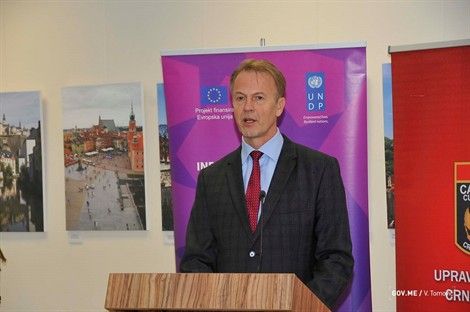
The Head of the EU Delegation to Montenegro, Aivo Orav, reminded that the EU supports the Government of Montenegro in the demanding and expensive task of establishing effective control at the borders, through the financing of the implementation of the New Computerized Transit System (NCTS), which is the basis for the establishment of other necessary IT systems, in order to protect Montenegrin citizens, public health, the environment and cultural heritage.
He pointed out that Montenegro has achieved a lot in this area, but further progress is needed in certain areas, especially when it comes to the implementation of measures to facilitate trade and work on capacity building of customs officers and the provision of adequate staff.
Director of the Customs Administration Vladan Joković pointed out that increased volume of international trade and global threats, such as terrorism, organised crime and trade in dangerous materials, led to major changes in the roles and responsibilities of customs officers, which today represent the first line of defense against numerous criminal organisations. For this reason, the primary task of the customs services is to ensure the necessary balance between protecting society and facilitating trade, adding that the development IT system is a major challenge in this negotiating chapter, bearing in mind that a large number of financial investments will be required.
"The work on strategic projects, obligations fulfillment in the EU agenda, simplification of customs procedures, further strengthening of cooperation with the business environment and uncompromised ties with institutions in terms of strong integrity are priorities in 2019,” Joković said.
The panel on "Importance of Customs Union for Citizens and Economy" was addressed by the Dean of the Faculty of Economics, prof. Nikola Milović, prof. Vladimir Savković from the Faculty of Law, Vice President of the Chamber of Economy of MontenegroLjiljana Filipović, representative of the company "Stadion doo Podgorica", Snezana Terzić, as well as representatives of the customs services of Slovenia and Montenegro Jože Kavčić and Tatjana Vujisić.
25 January 2019 - The time of the completion of Montenegro's negotiations with the EU, which have so far lasted for six and a half years, will also depend on how and to whom the Montenegrin Government will give economic citizenship. This new condition derived from the European Commission (EC) Report on the risks of investor citizenship and residential schemes in the EU.
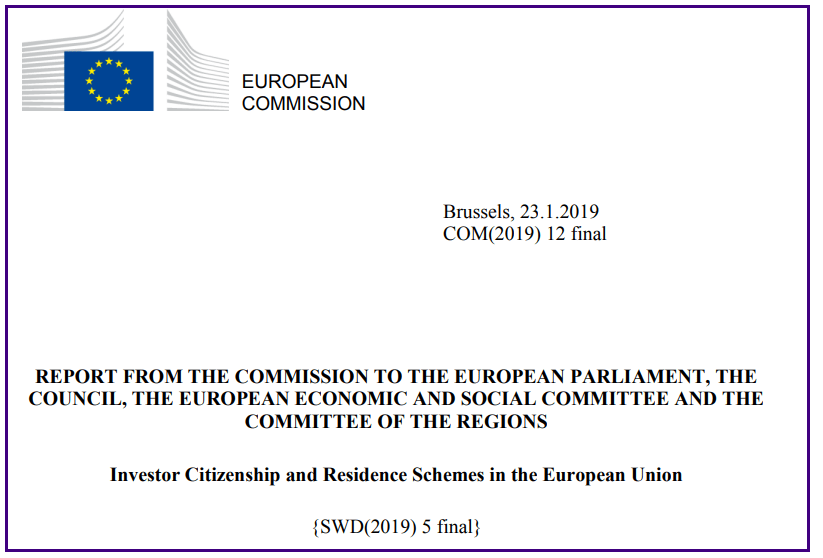
"Concerning third countries setting up investor citizenship schemes, which may have security implications for the EU, the Commission will monitor investor citizenship schemes in candidate countries and potential candidates as part of the EU accession process. It will also monitor the impact of such schemes by EU visa-free countries as part of the visa-suspension mechanism," the EC Report said.
The part of the report on "third countries" states that candidate countries and potential candidates for EU membership "become more attractive to investors" given the prospect of becoming their citizens and the citizens of the EU.
This is, as stated in the EC Report, already the case as the citizens of the candidate countries and potential candidates have the right to enter the Schengen countries "for short stays," or for three months during the year.
“Investor residence schemes, while different from citizenship schemes in the rights they grant pose equally serious security risks to the Member States and the EU as a whole. A valid residence permit gives a third-country national the right to reside in the Member State in question, but also to travel freely in the Schengen area. While EU law regulates the entry conditions for certain categories of third-country nationals, the granting of investor residence permits is currently not regulated at EU level and remains a national competence,” says the Official Report.
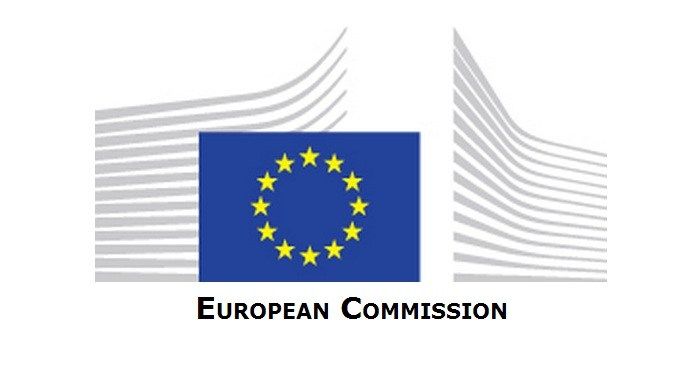
The report maps the existing practices and identifies certain risks such schemes imply for the EU, in particular, as regards security, money laundering, tax evasion, and corruption. "A lack of transparency in how the schemes are operated and a lack of cooperation among the Member States further exacerbate these risks," the report finds.
It is expected, furthermore, that the countries concerned will have very robust systems for monitoring these programs, including systems to combat possible security risks, such as money laundering, terrorist financing, corruption and infiltration of organized crime related to such programs. The EC sent a warning to the possibility of suspending the visa-free regime to Moldova, which is the third country mentioned in the report. In 2013, Moldova signed an EU Accession Treaty with the EU to apply the visa-free regime that has been in force since 2009 for Montenegro and most of the Western Balkan countries since the following year.
24 January 2019 - At today's session, the Government of Montenegro passed the Montenegro Economic Reform Programme 2019-2021, as the most important document in the economic dialogue with the European Union. The Economic Reform Programme is also a strategic document for medium-term macroeconomic and fiscal programming, which also contains the accompanying agenda of structural reforms necessary for reducing or eliminating obstacles to economic growth and strengthening competitiveness. Montenegro's strategic development goal defined by the programme is a sustainable and inclusive economic growth that will contribute to reducing the development gap about the EU average and increasing the quality of life of citizens. The programme is entirely consistent with the annual Budget Law and the Medium-Term Budget Framework, as well as the strategic development documents of Montenegro.
The Cabinet also passed the Agrobudget for 2019 amounting to 52.4 million EUR (31% more than last year).
Customs Tariff Regulation for 2019 was also approved, which specifies the level of customs rates for this year, in line with the dynamics established by the Law on the Confirmation of the Protocol on the Accession of Montenegro to the Marrakesh Agreement on the Establishment of the World Trade Organisation. The basic changes relate to the reduction of customs rates and changes in the nomenclature. Annex I of the Protocol on the Accession of Montenegro to the WTO for a certain number of products from the Customs Tariff (mainly agricultural products) defines the so-called "the ultimate upper boundary restriction," which represents the rate of duty to be applied by Montenegro up to a specific date on imports of those products. It is stipulated that the reduction of customs rates will be implemented annually in the same stages, starting from the date of accession of Montenegro to the WTO.
To comply with European and international laws, the Government amended the National Air Transport Facilitation Programme.
The Government also confirmed the Action Plan for the harmonisation of special laws with the Law on State Administration. The new Law on State Administration prescribes, among other things, the criteria for the establishment of state administration bodies, state agencies and funds, the way of planning work and reporting through monitoring the results achieved in relation to the set goals, clear lines of responsibility at all levels, in order to contribute efficiency of work and operation and provide a high level of quality in the provision of services. The harmonisation of special laws with the Law on State Administration improve the organisational structure and align the organisation of the state administration with the European standards.
22 January 2019 - It is in the interest of the citizens of Herceg Novi that the “Dr. Simo Milošević” Institute and the Meljine hospital retain the focus on health tourism and improve their activities, said the President of the municipality, Stevan Katić, at a meeting with British Ambassador Alison Camp.
On January 22, Ambassador of Great Britain to Montenegro, Her Excellency Ms Alison Camp met with the Mayor of Herceg Novi Stevan Katić and his associates.
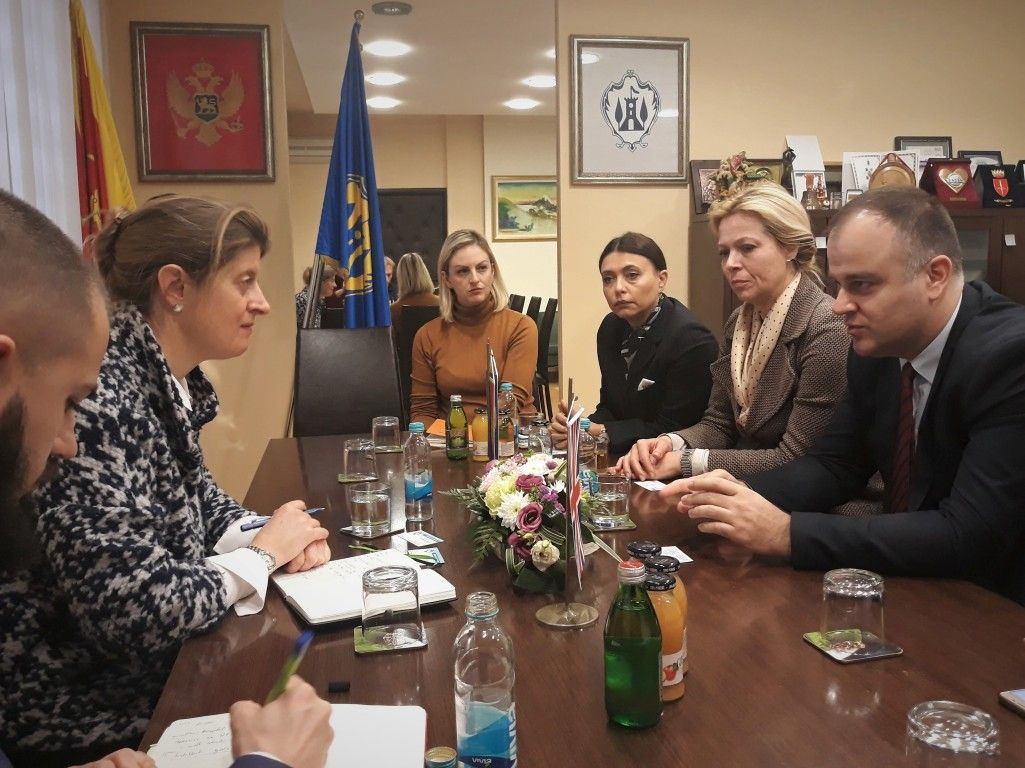
The focus of the first official discourse between Katić and Camp were the potentials for the development of Herceg Novi, the vision of local government, current and planned projects, the relationship between local and state authorities, and the issue of privatisation of the Institute “Dr. Simo Milošević” in Igalo and Meljine Hospital.
The Ambassador pointed out that Herceg Novi is a city of significant potentials, which development should be carefully planned. In this regard, the representatives of the Municipality informed Her Excellency about the adoption of the Spatial Plan of the Municipality, as well as about the activities and difficulties in that area.
Ambassador Camp expressed her interest in the issue of privatisation of the Institute "Dr. Simo Milosevic" in Igalo and the status of the Meljine hospital, and emphasised that she is following these processes with great care.
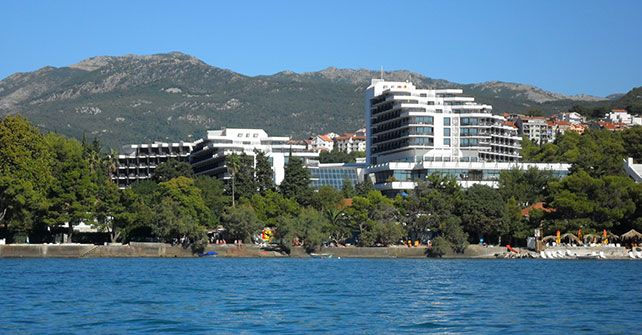
Katić stressed that it is in the interest of the citizens of Herceg Novi that these institutions retain their focus on health tourism and improve their activities.
The Institute for physical medicine, rehabilitation and rheumatology “Dr. Simo Milošević” in Igalo, Herceg Novi is the largest and most important multidisciplinary health and recreational centre in Montenegro and in the region, with a majority stake owned by the State of Montenegro. The Institute is a pioneer of the modern physical and preventive medicine, rehabilitation, thalassotherapy and wellness, and it has become one of the leading international centres for rehabilitation of children, adults and seniors. It is located on the attractive coastal region of Montenegro, famous for springs of mineral water and healing mud, warm, crystal clear sea and lush vegetation full of healing herbs.
21 January 2019 - An Unprecedented list of priority infrastructure projects, supplemented by projects in the field of digital infrastructure, was approved at the last session of the Government of Montenegro. Among the priority projects worth hundreds of millions of euros, several are linked to Herceg Novi. As reported by Montenegrin daily newspapers “Dnevne novine”, “the implementation of these projects requires either the completion of planned or project documentation or solving possible property-legal issues”.
The most valuable project is the construction of the coastal “version” of the Adriatic-Ionian highway along the Montenegrin coast. This project will include seven segments, i.e. the development of bypasses in coastal municipalities within the country. The bypass around Herceg Novi, i.e. the section from the border on Debeli brijeg to Bijela, should be 17 kilometres long (8 kilometres of the bypass and 9 kilometres of Herceg Novi-Bijela road). The estimated construction value is 193,2 million EUR. According to the Methodology for the selection and prioritization of infrastructure projects, the project is rated with a score of 2C, which means that the project either has flaws in spatial planning documents or unresolved property-legal issues.
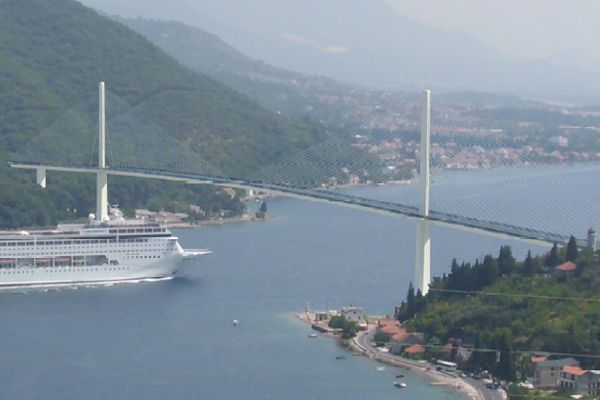
The construction of a bridge over the Bay of Kotor, with viaducts and access roads, was estimated at 67,9 million EUR.
The "Verige" Bridge is planned at the site of Cape St. Nedjelja/Cape Opatovo and is an integral part of the highway along the Montenegrin Coast. The total length of the bridge amounts to 981 metres, of which the span between the main supports is 450 metres. The main bridge structure will be built as a "Cable Stayed System". The length of the access roads to the bridge from both sides amounts to totally 1800 m. A 200 metres long viaduct is planned on the access road towards Tivat. The construction of the "Verige" Bridge will make the road from Tivat to Herceg Novi considerably shorter, improve the traffic conditions and the complete tourist offer of Montenegro.

This project is assessed by Methodology as 1b, which means that it is a project for which the preparation of technical documentation is in progress, which precedes the tender procedure, i.e. a project that lacks certain final consents/permits.
Within the framework of the Waste Management projects, the estimated value of construction of the Sanitary Landfill Duboki do was projected at 7.4 million EUR.
January 22, 2019 - Montenegrin President Milo Djukanovic dismissed claims from businessman and owner of the Atlas Group Dusko Knezevic who said in the previous days that he had donated €200,000 to Djukanovic in the pre-election period. But, he did not deny that Knezevic was the financier of the ruling Democratic Party of Socialists.
21 January 2019 - Prime Minister Duško Marković said that 2018 was the year of demanding and progressive work of the Government and continuous progress of Montenegro, especially on the economic level, but also in the development of European integration, and he announced that the priorities of the Government this year would be the continuation of implementation of the obligations from the European agenda, more intense dynamics and comprehensive action against the informal economy. Prime Minister Marković participated in a special meeting of EU ambassadors and Head of the EU Delegation in Podgorica and emphasised that they are witnessing the continuous progress of Montenegro.
"In addition to demanding and hard work, all the more visible effects of progress towards the European Union and membership in NATO are contributing to the quality of stability, which creates the space for us to dedicate ourselves unhindered to what society needs for sustainable development. In the year behind us, definitely a significant achievement of the Government is its economic policy, which continued to deliver excellent results in all the most important parameters. The growth of the economy in 2018 is impressive and equals 4.5% in the first quarter, 4.9 in the second, and in the third, it was 5%. The gross income per capita has also grown. In the past year, the unemployed were almost 10,000 less than in 2017. The unemployment rate has decreased by 4 percent from 22.1 percent, at the end of 2017. The decrease in unemployment has contributed to an increase in overall economic activity, strong economic growth, which has led to the creation of new jobs, that is, an increase in the number of employees by close to 7,000 at the end of 2018 compared to the same period of 2017 or nearly 12,000 in relation to the end of 2016"- said the Prime Minister at a meeting with the ambassadors of the member states of the European Union.
Prime Minister Marković emphasised that revenue collection in the past year was higher than almost 180 million EUR, that the budget deficit in 2018 was 3.5 percent compared to 5.7 percent in 2017, and that according to the data of the Central Bank Montenegro, the total inflow of foreign direct investments for the twelve months of 2017 amounted to 659 million EUR, and in the first 11 months last year, 747 million EUR.
Addressing the ambassadors of the European Union, the Prime Minister outlined the breakdown of the boycott of parliament and the beginning of dialogue within the parliamentary working group on electoral legislation as an important fact in the political agenda of the last year.
"I will repeat once again: dialogue can be conducted only in institutions, where only citizens' interests are promoted and democracy strengthened. In this year, the priorities of the Government are clear: primarily the continuation of obligations from the European agenda with an even more intense and better quality dynamics. Our goal is to open the only remaining chapter, Chapter 8 - Competition, meeting provisional benchmarks in Chapters 23 and 24 and reaching our internal readiness to close the chapters. We have already made progress in fulfilling obligations from the last benchmarks in six negotiating chapters," Prime Minister Marković said.
"Our goal is even more accelerated growth of the economy and creation of new jobs through the realization of capital investments, with foreign investments, further development of small and medium enterprises and improvement of business environment. To achieve this goal, the Government will launch a comprehensive action against the informal economy this year with normative interventions as well as strong and determined actions of tax authorities and law enforcement agencies. Certainly, we will continue to be active in the region in supporting neighbours and transferring our experiences from the integration processes. We will continue to justify the position we have in the process of joining the Union, within the region and as a member of NATO with our actions," the Prime Minister noted.
Prime Minister Duško Marković thanked the ambassadors for their engagement and contribution to the development of Montenegro and congratulated Romania for taking over the presidency of the Council of the European Union.
"We know that during the presidency, Romania will have difficult tasks ahead, issues of the EU's multi-annual budget, Brexit, migration ... so we appreciate that among the priorities IS the issue of enlargement as well. We are confident that they will successfully face these challenges. I want to thank Austria, during whose presidency we have opened a very important Chapter 27 - Environment and Climate Change. Cooperation with the Three, which, in addition to Romania, includes Finland and Croatia, is an additional opportunity for us in the coming period, because all three countries are our friends and partners who understand the Western Balkans and Montenegro, as well as the significance of the enlargement policy," the Prime Minister stated.
The meeting was also addressed by the Ambassador of Romania to Montenegro, Ferdinand Findi, who spoke about the priorities of the Romanian Presidency of the Council of the European Union, as well as the head of the EU Delegation to Montenegro, Aivo Orav.
20 January 2019 - The Government of Montenegro passed the Report on the Implementation of the Programme of Action of the Government of Montenegro for 2018, which shows that the level of fulfillment of obligations exceeds three quarters (77.2%). The discussion stressed that excellent results were made in 2018, including high economic growth, a significant reduction in unemployment, a rise in foreign investment and intensive implementation of development projects.
Priorities of the Government for this year, which should set the basis of the 2019 Programme of Action, in addition to the obligations from the European integration, include continuous and comprehensive activities and hard work to continue dynamic economic growth, improvement of business environment, foreign investment inflow, fiscal stability, effective fight against grey economy, implementation of projects from the Capital Budget and advancement of the quality of public services - as prerequisites for the achievement of the most important goal of the Government - creating new jobs and increasing the living standards of citizens.
"This year, our most important goal is to increase the quality of life of citizens," said Prime Minister Duško Marković.
The Government passed the Draft Law on Administrative Fees and the Draft Law on Local Utility Fees. The new law on administrative fees is proposed with the aim of improving the conditions for doing business and improving economic activity, both at state and local levels. Accordingly, the defined solutions result in lower operating costs, especially for micro and small enterprises through the application of lower fees, fewer payments, and fewer procedures, as well as lower costs for citizens, resulting in more available income for consumption or saving and positively affecting economic growth.
The Draft Law on Local Utility Fees contributes to improving the conditions for doing business at the local level by creating a simpler collection model for local self-government units, as well as creating a simpler model of settling obligations towards local governments by citizens and businesses.
20 January 2019 - Montenegro will have support from Great Britain in tightening tax discipline, through a joint project in the domain of the suppression of the grey economy. This was the main subject of the today’s meeting held between the Minister of Sustainable Development and Tourism, Pavle Radulović and the Ambassador of Great Britain, Alyson Camp.
They jointly stated that it was necessary to reinforce controls of the work of tourism employees and improve the function of local secretariats regarding that matter, all with the aim of increasing profit in the state budget and local budgets. The Minister pointed out that the Ministry was working hard on creating a database of the issuers of unregistered private accommodation.
“Even though the season was a record, illegal accommodation and lack of registration are our problems. Those who earn money this way must be aware that they are depriving future generations of the income they need for education, healthcare, etc,” said the Minister.
The cooperation between the two states is good. British tourists are visiting Montenegro more and more. Also, the collaboration with British tour operators and agencies is stable.
The Minister and the Ambassador talked about the pollution of the environment from plastic waste. The UK will assist in plastic waste management.
Camp showed interest in the organization of the future football match between Montenegro and Great Britain. She hopes for the friendly reception of British football lovers in Podgorica.
Director of Chamber of Commerce of Montenegro, Vlastimir Golubović, said that the most common barriers that businessmen point out are grey economy and unfair competition, non-liquidity or recovery of debts, numerous and high taxes, fees at the local level, high contributions on wages, high capital prices and difficult access to loans, barriers in legal regulation, problems of insufficient flexibility of labor market, lack of professional staff and frequent amendments of regulations.






